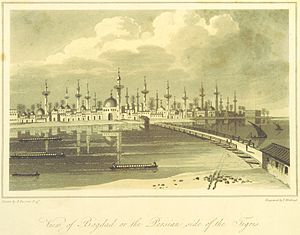Abu al-Hasan al-Ashʿari
| Imam al-Ashʿarī | |
|---|---|

A depiction of Baghdad from 1808, taken from the print collection in Travels in Asia and Africa, etc. (ed. J. P. Berjew, British Library); al-Ashʿarī spent his entire life in this city in the twelfth-century
|
|
| Theologian; Great Articulator of Orthodox Theology Champion of Islam |
|
| Venerated in | Sunni Islam, but his theology has been controversial among those latter-day Sunnis who follow the Athari creed |
| Major shrine | Tomb of al-Ashʿarī, Baghdad, Iraq |
| Abu al-Hasan al-Ash'ari | |
|---|---|
| Title | Imam al-Mutakallimin, Imam Ahl al-Sunnah wa al-Jama'ah |
| Born | AH 260 (873/874) Basra |
| Died | AH 324 (935/936) (aged 64) Baghdad |
| Ethnicity | Arab |
| Era | Islamic golden age |
| Religion | Islam |
| Jurisprudence | Sunni |
| Creed | Sunni Shafi'i |
| Main interest(s) | Islamic theology |
| Notable work(s) | Maqalat al-Islamiyyin wa Ikhtilaf al-Musallin (The Treatises of the Islamic Schools), al-Luma' fi al-Rad 'ala Ahl al-Ziyagh wa al-Bida' (Refutation to Heresy), Al-Ibanah 'an Usul al-Diyanah, Risalah ila Ahl al-Thaghr |
|
Influenced by
|
|
|
Influenced
|
|
Abū al-Ḥasan al-Ashʿarī (أبو الحسن الأشعري; full name Abū al-Ḥasan ʿAlī b. Ismāʿīl b. Isḥāq al-Ashʿarī; c. 874–936 (AH 260–324), for short al-Ashʿarī; reverentially Imām al-Ashʿarī) was an Arab Sunni Muslim scholastic theologian and eponymous founder of "the most important theological school in Sunni Islam," known as Asharism or Asharite theology. The principal feature of this school was its use of rational or logical argumentation to defend the positions of Sunni Islam against all other opposing theologies, such as those of the Kharijites, the Mutazilites, the Jahmites, and others. Al-Ash'ari's school eventually won "wide acceptance within Sunni Islam, the official theological creed of which came largely to be defined by Ash'ari principles." Alongside the theological school of Abu Mansur al-Maturidi (d. 944), the Ash'ari school is sometimes defined in mainstream Sunni Islam as one of the two principal "orthodox theologies" of the faith, despite the fact that the more textualist school of Hanbali theology has survived alongside both of them.
Due to his role in combating the other splinter groups of theology, al-Ash'ari is honored in Sunni tradition by the epithets Imām al-mutakallimūn ("Leader of the Theologians") and Imām ahl as-sunnah wa l-jamāʿah ("Leader of the Sunnis").
Al-Ash'ari was born in Basra, Iraq, and was a descendant of the famous companion of Muhammad, Abu Musa al-Ashari. As a young man he studied under al-Jubba'i, a renowned teacher of Mu'tazilite theology and philosophy. He remained a Mutazalite until his fortieth year when al-Ash'ari saw Muhammad in a dream 3 times in Ramadan. Muhammad told him to support what was related from himself, that is, the traditions (hadiths). After this experience, he left the Mu'tazalites and became one of its most distinguished opponents, using the philosophical methods he had learned. Al-Ash'ari then spent the remaining years of his life engaged in developing his views and in composing polemics and arguments against his former Mutazalite colleagues. He is said to have written up to three hundred works, of which only four or five are known to be extant.
...
Wikipedia
